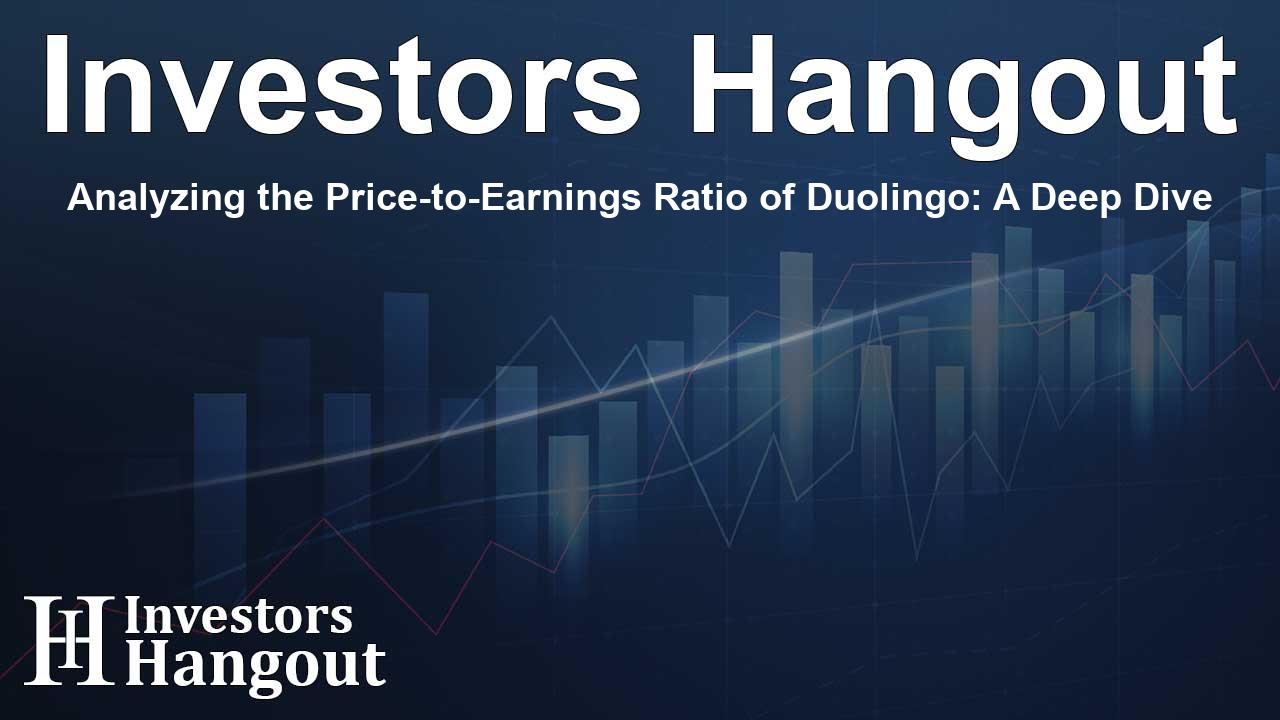Analyzing the Price-to-Earnings Ratio of Duolingo: A Deep Dive

Understanding Duolingo's Current Stock Performance
Duolingo Inc. (NASDAQ: DUOL) shares are currently priced at $351.47, reflecting a decrease of 5.10% in the latest session. While the stock has seen a decline of 7.09% over the past month, it has notably surged by 83.50% in the past year. This mixed performance leads investors to contemplate the implications of its price-to-earnings ratio as they weigh short-term volatility against long-term growth potential.
What is the Price-to-Earnings Ratio?
The price-to-earnings (P/E) ratio is a critical metric leveraged by investors to gauge a company's market performance relative to its earnings. This ratio can inform shareholder expectations regarding future profitability. A lower P/E ratio may signify either an undervalued stock or a lack of confidence in its future performance among investors.
Duolingo's P/E Ratio Comparison
Duolingo's P/E ratio currently stands at 151.78, which significantly exceeds the mean P/E ratio of 25.0 within the Diversified Consumer Services sector. Although this might suggest that Duolingo is positioned for stronger future performance compared to its industry peers, it could also point to potential overvaluation of the stock.
Long-Term Value and Investment Strategy
Investing based on the P/E ratio alone can be misleading as it needs to be viewed in conjunction with other financial metrics and market conditions. While Duolingo’s favorable long-term growth may justify its higher P/E, investors should assess industry trends and overall economic factors impacting the market before making decisions.
Factors Influencing Duolingo's Valuation
Market trends, advancements in educational technology, and competitive dynamics all play a substantial role in determining how Duolingo and similar companies are valued. As digital learning continues to evolve, stakeholders should closely monitor these developments to make informed investment choices.
Making Informed Investment Choices
Ultimately, while the P/E ratio is a valuable tool for analyzing market performance, it should be part of a holistic investment strategy. Considering qualitative factors, such as market positioning and innovation potential, is paramount for investors looking to capitalize on Duolingo's future prospects.
Frequently Asked Questions
What does Duolingo's current stock price indicate?
As of now, Duolingo's stock is priced at $351.47, showing significant year-over-year growth despite some recent decline.
How does the P/E ratio help investors?
The P/E ratio helps investors evaluate a company's valuation and growth expectations, guiding better investment decisions.
Is Duolingo stock overvalued?
With a P/E ratio of 151.78, it may suggest that Duolingo's stock is overvalued compared to the industry average of 25.0.
What factors influence Duolingo's stock performance?
Industry trends, technological advances, and macroeconomic conditions significantly influence Duolingo's stock performance and valuation.
Should investors focus solely on the P/E ratio?
No, investors should consider a variety of financial metrics and qualitative insights when making investment decisions to avoid potential pitfalls.
About The Author
Contact Hannah Lewis privately here. Or send an email with ATTN: Hannah Lewis as the subject to contact@investorshangout.com.
About Investors Hangout
Investors Hangout is a leading online stock forum for financial discussion and learning, offering a wide range of free tools and resources. It draws in traders of all levels, who exchange market knowledge, investigate trading tactics, and keep an eye on industry developments in real time. Featuring financial articles, stock message boards, quotes, charts, company profiles, and live news updates. Through cooperative learning and a wealth of informational resources, it helps users from novices creating their first portfolios to experts honing their techniques. Join Investors Hangout today: https://investorshangout.com/
The content of this article is based on factual, publicly available information and does not represent legal, financial, or investment advice. Investors Hangout does not offer financial advice, and the author is not a licensed financial advisor. Consult a qualified advisor before making any financial or investment decisions based on this article. This article should not be considered advice to purchase, sell, or hold any securities or other investments. If any of the material provided here is inaccurate, please contact us for corrections.
